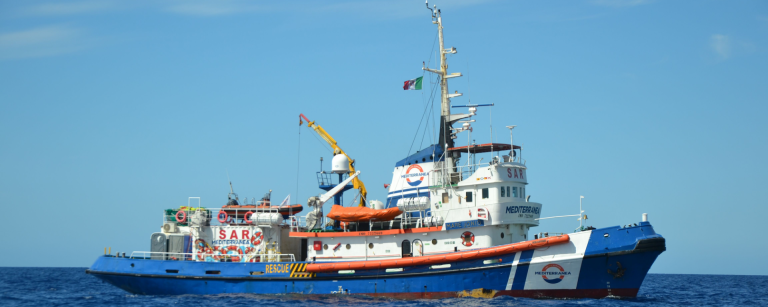The Mare Jonio, a humanitarian vessel operated by Mediterranea Saving Humans, has recently faced significant restrictions from Italian authorities following its 18th mission. After returning to Trapani for its routine annual inspections, the ship’s owner and captain received a formal warning from the Italian Maritime Authority. The warning cited a “lack of proper certification” and prohibited the vessel from continuing its search and rescue operations at sea. Failure to comply with this directive could result in legal consequences under Article 650 of the Italian Penal Code, which carries a potential prison sentence of up to three months.

– Italy Correspondent
A Pattern of Obstruction?
The incident with Mare Jonio is not an isolated case. It reflects a pattern of restrictive measures taken by the Italian government against NGOs involved in migrant rescue missions. In September 2023, the Italian government issued a directive that allowed Mare Jonio to sail but explicitly forbade it from conducting rescue operations. Paolo Ciani, a Member of the Chamber of Deputies, criticized this directive, stating, “It is absurd […] and it seems clear that there is a persistent effort by the government to punish and obstruct those who are trying to save human lives, rather than supporting, cooperating with, and thanking them, especially in the current tragic situation”
According to Mediterranea Saving Humans, the ship recently passed a RINA inspection on 28 August 2024, which confirmed its certification as a vessel “particularly equipped for rescue services.” Despite this, the dispute over its certification, remains unresolved, with the organization currently appealing the decision in court.
Impact on Humanitarian Efforts
Human rights organizations, including Human Rights Watch and the United Nations, have previously argued that such restrictions can endanger lives by deterring rescue operations. The crew ofMare Jonio and their supporters argue that their primary mission is to save lives. The ongoing legal battle diverts essential resources from rescue missions to court defences, potentially impacting the vessel’s ability to carry out its humanitarian work.
This situation underscores the ongoing tension between legal enforcement and humanitarian principles in the Mediterranean. As the legal battle over Mare Jonio’s certification continues, the future of rescue missions by NGO vessels remains uncertain. This incident highlights the need for a balanced approach that ensures compliance with maritime law while still supporting the critical life-saving efforts carried out by humanitarian organizations. A resolution that respects both legal standards and humanitarian needs is crucial to ensure that vital rescue operations can continue in the Mediterranean.




